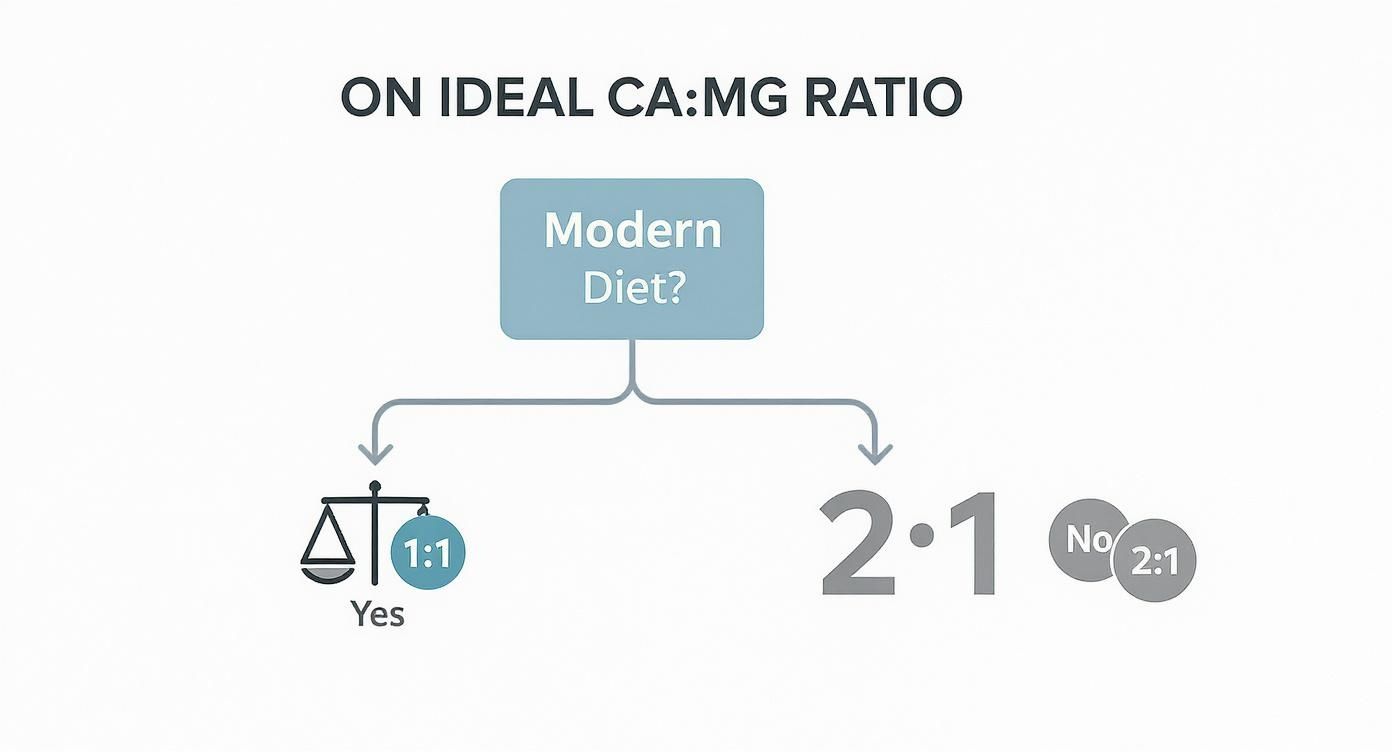
A Guide to Calcium and Magnesium Supplements
Share
You’ll often see calcium and magnesium supplements sold together, and for good reason. These two essential minerals work in synergy, meaning one’s job often complements or balances the other’s. This is especially true for bone health, sleep, and muscle function.
Think of them as a team: calcium is the builder that handles contractions, while magnesium is the manager that oversees relaxation.
The Dynamic Duo Your Body Needs

Imagine your body is a major construction project. In this scenario, calcium acts as the bricks and mortar – it's the fundamental building block that creates a strong, resilient structure. This is what gives your bones and teeth their density, forming the very framework that supports you. Without enough calcium, that framework can become weak and brittle over time.
But bricks alone don't make a functional building. You need a skilled foreman on site to manage the entire operation, making sure materials go where they're needed and ensuring all the complex systems, like plumbing and electrics, run smoothly. That's where magnesium steps in.
The Foreman and The Bricks
Magnesium is the master foreman of your body's mineral workforce. It’s involved in over 300 biochemical reactions, and one of its most critical jobs is directing calcium to where it needs to be – primarily, your bones. It also plays a vital role in preventing calcium from building up where it shouldn't, like in soft tissues or arteries, which could lead to problems down the line.
Beyond this, these two minerals share an elegant push-and-pull relationship that governs countless bodily functions:
- Muscle Movement: Calcium is essential for your muscles to contract, while magnesium is needed for them to relax. An imbalance here is a classic recipe for cramps and spasms.
- Nerve Signals: Think of calcium as exciting your nerve cells to fire off messages. Magnesium, on the other hand, helps to calm the nervous system down.
- Heart Rhythm: This very same contract-relax dynamic is absolutely crucial for maintaining a steady, healthy heartbeat.
This incredible synergy is why just taking one mineral without the other might not give you the full picture. They are designed to work in harmony, creating a biological balance that supports your well-being from the inside out. Getting to grips with their roles is key, and while supplements are one route, you can also explore the benefits of adding essential minerals back into water.
With a growing awareness of bone health, particularly in an ageing population, the focus on these minerals has never been greater. The UK market for mineral supplements clearly shows this trend. Calcium alone accounts for 39.6% of the sector's total revenue, which recently hit USD 513.4 million.
In this guide, we'll dive deeper into their individual roles, helping you understand how to harness their combined power for your own health.
Calcium's Critical Roles Beyond Bone Health

When you hear "calcium," your mind probably jumps straight to strong bones and teeth. And you wouldn't be wrong—roughly 99% of your body's calcium is stored in your skeleton. But that remaining 1% plays an astonishingly active role in keeping you alive and well, second by second.
Thinking of calcium only for bone density is like thinking of a smartphone as just for making calls. You’d be missing out on all its most dynamic and important functions.
This tiny fraction of non-bone calcium is a powerful signalling molecule, carrying vital instructions between cells to keep your body running like a well-oiled machine. Without this constant communication, fundamental biological actions would simply grind to a halt. If you're looking to support this incredible framework, you can learn more about choosing the right supplement for bones and joints.
The Spark Behind Every Movement
Every single move you make—from lifting a kettlebell to the steady, rhythmic beat of your heart—is powered by calcium. Think of your muscles as engines and calcium ions as the spark plugs. When your brain decides to move a muscle, it sends an electrical signal to the muscle cells.
This signal triggers a release of calcium, which binds to specific proteins and causes the muscle fibres to contract, creating movement. Simple as that.
This process isn't just for voluntary actions like walking or typing. It’s also essential for the involuntary muscle functions we never think about, like the contractions of your heart pumping blood or the smooth muscle movements in your digestive system.
This is where the partnership with magnesium becomes so clear. While calcium is the "on" switch for contraction, magnesium is the crucial "off" switch that allows muscles to relax again.
A Master Communicator in the Nervous System
Beyond muscle function, calcium is a cornerstone of your nervous system's communication network. It’s how your brain talks to the rest of your body. When a nerve impulse travels down a neuron, it needs to pass its message to the next cell.
To do this, calcium ions flood into the nerve ending. This acts as the trigger, prompting the release of chemical messengers called neurotransmitters.
These neurotransmitters then zip across the gap to the next nerve cell, effectively relaying the signal. This lightning-fast process happens every single time you think, feel, or react. Without enough calcium, this vital communication chain would feel weak and sluggish, affecting everything from your reflexes to your thought processes.
Other Essential Behind-the-Scenes Jobs
Calcium's responsibilities don't stop there. It's a key player in several other silent but life-sustaining operations that often go unnoticed.
- Blood Clotting: When you get a cut, calcium works with Vitamin K and a protein called fibrinogen to create a clot and stop the bleeding. It’s a vital part of your body's emergency repair crew.
- Hormone Secretion: Many glands, like the pituitary and pancreas, rely on calcium to release critical hormones into your bloodstream. This influences everything from your metabolism to your stress response.
- Enzyme Function: Countless enzymes—the proteins that speed up chemical reactions—require calcium to work properly, supporting crucial processes like digestion and metabolism.
Seeing these diverse roles makes it clear why consistent calcium intake is so important. It's not just an investment in your future bone health; it's a daily requirement for keeping your entire system firing on all cylinders.
Magnesium: The Body's Calming Mineral

While calcium gets all the credit for building our body's framework, magnesium is the quiet, indispensable force working behind the scenes. It’s the ultimate multitasker, a master regulator involved in over 300 essential biochemical reactions that keep everything running like a well-oiled machine.
Think of it as your body’s internal operations manager. Magnesium’s influence is incredibly far-reaching, from helping to turn food into energy to ensuring your nerves fire correctly. A dip in this critical mineral can cause a domino effect, throwing everything from your mood and energy to muscle comfort out of whack.
It's clear people are catching on. The UK dietary supplements market, which includes both calcium and magnesium supplements, was recently valued at a whopping USD 4.79 billion. Interestingly, offline channels like pharmacies and health shops still account for a massive 82.8% of sales, showing just how much we value face-to-face advice when picking our supplements. You can explore more insights into the UK supplement market and its growth.
A Natural Gatekeeper for Calcium
One of magnesium's most vital jobs is its dynamic relationship with calcium. If you imagine calcium as the "on" switch for muscle contraction, then magnesium is the crucial "off" switch. It's what allows your muscles to relax after they’ve tensed up, which is exactly why a magnesium shortfall is so often linked to those frustrating muscle cramps and spasms.
This balancing act is absolutely essential. Magnesium acts as a natural gatekeeper, guiding calcium into your bones where it's needed for strength and structure. Without enough magnesium on duty, calcium can start to build up in places it shouldn't—like soft tissues, arteries, or joints.
By managing where calcium goes and what it does, magnesium doesn't just support our skeleton. It also plays a huge role in cardiovascular health by helping to keep our blood vessels flexible.
This elegant partnership really underscores why we need to think of these minerals as a duo. One simply can't do its job properly without the other.
The Ultimate Relaxation Mineral
Magnesium has well and truly earned its reputation as the body’s calming mineral. It takes a leading role in managing your stress response, helping to regulate the neurotransmitters that promote a sense of calm and well-being.
It works by activating your parasympathetic nervous system—the part responsible for helping you "rest and digest." Essentially, it helps to quieten down nerve activity, easing feelings of anxiety and mental chatter.
This calming effect is a game-changer for sleep. Magnesium supports healthy levels of GABA, a neurotransmitter that puts the brakes on brain activity, preparing your mind and body for a restorative night's sleep. Many people find that getting enough magnesium helps them drift off more easily and improves their sleep quality overall.
Here's a quick rundown of magnesium's key functions:
- Energy Production: It’s essential for creating ATP, the main energy currency that fuels every single one of your cells.
- Nerve Function: It helps transmit nerve signals properly and keeps the nervous system from getting overexcited.
- Blood Sugar Control: Magnesium is a key player in insulin sensitivity, helping to keep blood sugar levels stable.
- DNA Synthesis: It’s a required cofactor for building and repairing our DNA and RNA.
When you see just how many hats it wears, it's clear magnesium isn't just a supporting actor; it's a headline performer in your body's daily wellness show. Ensuring you have enough of this calming mineral is fundamental to feeling balanced, relaxed, and ready to take on the day.
Getting the Dose and Ratio Just Right
Trying to figure out the right amount of calcium and magnesium can feel like a tricky balancing act. It's not simply about taking more; it’s about getting the right amount for your body’s unique needs. Nailing your ideal dosage and ratio is the real secret to unlocking what these essential minerals can do for you.
For years, the go-to advice was a 2:1 ratio of calcium to magnesium. This thinking was based on the idea that our diets were already quite rich in magnesium, so supplements needed to tip the scales in favour of calcium. But this traditional wisdom is starting to get a rethink.
Our modern diets, often heavy on processed foods and light on things like leafy greens and nuts, have completely changed our natural mineral intake. Because of this, many health experts now suggest that a 1:1 ratio is a much better fit for most people, as it helps to correct the balance that our current eating habits often throw off.
What Are the Daily Targets?
To supplement smartly, you first need to know the baseline recommendations. These numbers, set by UK health authorities, are a target for your total daily intake from all sources—that means both food and supplements combined.
The amount of calcium and magnesium you need isn't set in stone; it shifts depending on your age, gender, and stage of life. A growing teenager, for instance, has very different needs from a woman over 50 who’s focused on keeping her bones strong.
To give you a clearer picture, here’s a breakdown of the recommended daily amounts for calcium and magnesium in the UK.
Daily Calcium and Magnesium Recommendations by Age and Gender
| Demographic | Recommended Calcium (mg/day) | Recommended Magnesium (mg/day) |
|---|---|---|
| Adult Men (19-64 years) | 700 mg | 300 mg |
| Adult Women (19-64 years) | 700 mg | 270 mg |
| Adults (65+ years) | 700 mg | 300 mg (Men), 270 mg (Women) |
| Pregnant Women | 700 mg | 270 mg |
| Breastfeeding Women | 1250 mg | 320 mg |
These figures are a great starting point, but remember, they are general guidelines. For advice tailored specifically to you, it's always best to have a chat with a healthcare professional.
Always Start with Your Diet
Before you even think about opening a supplement bottle, take a moment to look at what you’re already getting from your food. The whole point of a good supplement routine is to fill in the gaps, not to create an overload.
Think of it like this: your daily mineral goal is a bucket you need to fill. Your food should always be the first and most important layer. A supplement is just there to top it up to the right level.
The most effective way to supplement is to start with a food-first approach. When you know what you’re getting from your diet, you can supplement with precision, giving your body exactly what it needs without going overboard.
For example, a diet packed with the following foods will get you a good way towards your daily targets:
- Calcium-Rich Foods: Dairy like milk, cheese, and yoghurt, fortified plant milks, leafy greens like kale, and tinned fish with bones (think sardines).
- Magnesium-Rich Foods: Nuts and seeds (especially almonds and pumpkin seeds), whole grains, dark chocolate, avocados, and legumes like black beans.
By getting a rough idea of your intake from these sources, you’ll be in a much better position to decide what dose of calcium and magnesium supplements you might actually need.
Finding the Ratio That’s Right for You
So, which is it to be—the old-school 2:1 or the more modern 1:1? The truth is, the answer really comes down to your diet and lifestyle.
A 1:1 ratio might be your best bet if:
- You don't eat a lot of magnesium-rich foods like nuts, seeds, and leafy greens.
- You're experiencing symptoms often linked to low magnesium, such as muscle cramps or trouble sleeping.
- You do a lot of intense exercise, which can use up your magnesium stores more quickly.
A 2:1 ratio could be more suitable if:
- You follow a dairy-free diet and find it hard to get enough calcium from food alone.
- You have a specific health condition that means you need more calcium (and a doctor has advised this).
At the end of the day, finding your personal dose is about listening to your body and looking at your unique situation. When you take these minerals can also make a difference. To learn more, check out our guide on the best time to take magnesium.
How to Choose the Right Supplement Form
Walking down the supplement aisle can feel a bit like wading through a jungle. With so many bottles claiming different things, picking the right form of calcium and magnesium can seem like an impossible puzzle. But it really doesn't have to be.
The secret is getting your head around one simple but vital idea: bioavailability. It’s just a scientific way of asking, "How much of this mineral can my body actually absorb and put to good use?" After all, a supplement isn't doing much for you if most of it passes straight through your system.
Different forms of these minerals, often called chelates or salts, have hugely different bioavailability rates. This means the type you choose has a direct impact on how effective your supplement will actually be.
Decoding Common Calcium Forms
When you're looking at calcium, you'll almost always see two main contenders on the shelf: carbonate and citrate. They both get the job done, but they work in slightly different ways, which makes them better suited for different people.
- Calcium Carbonate: This is the most common and wallet-friendly option. It packs a high amount of elemental calcium, but it needs a good dose of stomach acid to be absorbed properly. That means it’s best to take it with a meal.
- Calcium Citrate: While it has less elemental calcium per pill, this form is much easier for the body to absorb. It doesn’t rely on stomach acid, so you can take it whenever you like, with or without food. This makes it a far better choice for older adults or anyone taking acid-reducing medications.
For many people, calcium citrate is the clear winner. It's gentler on the digestive system and its superior absorption often makes it worth taking an extra tablet to get the right dosage.
Navigating the World of Magnesium
The world of magnesium supplements is even more diverse, with each form offering its own unique perks. Some are brilliant for just topping up your overall levels, while others are targeted for specific goals like better sleep or muscle relaxation.
One of the most highly-regarded forms for helping you unwind and sleep better is magnesium glycinate. This form is bound to glycine, an amino acid that has calming properties of its own. If you’re after a gentle, highly absorbable option to support your nervous system, you can learn more about the specific benefits of our premium Magnesium Glycinate supplement.
Choosing the right form of magnesium isn't just about absorption; it's about matching the mineral's carrier molecule to your specific health goals, whether that's improving sleep, easing constipation, or supporting cognitive function.
The infographic below gives you a quick visual guide to help you figure out the right ratio for your lifestyle, which can also steer your supplement choice.

As the visual shows, a modern diet heavy in processed foods often calls for a more balanced 1:1 ratio, whereas a diet rich in whole foods might be better served by the traditional 2:1 approach.
Comparing Common Forms of Calcium and Magnesium
To help make your decision a bit clearer, let's break down the most common forms of both minerals side-by-side. This table lays out the pros and cons based on what matters most to you—whether that’s cost, absorption, or specific health benefits.
| Supplement Form | Bioavailability | Best For | Potential Considerations |
|---|---|---|---|
| Calcium Carbonate | Moderate | General bone health, cost-effective option | Requires stomach acid; best taken with food. Can cause constipation or gas. |
| Calcium Citrate | High | Individuals with low stomach acid, sensitive digestion | Contains less elemental calcium per pill, so more tablets may be needed. |
| Magnesium Oxide | Low | Effective for short-term constipation relief | Poorly absorbed, so not ideal for correcting a deficiency. High doses have a strong laxative effect. |
| Magnesium Citrate | Good | General magnesium replenishment and constipation relief | Well-absorbed and generally gentle, but can have a mild laxative effect at higher doses. |
| Magnesium Glycinate | Excellent | Promoting relaxation, supporting sleep, and calming the nervous system | Has virtually no laxative effect, making it ideal for those with sensitive stomachs. |
At the end of the day, picking the best calcium and magnesium supplements comes down to your individual body and health goals. By understanding these key differences, you can cut through the marketing noise and make a confident, informed choice that truly supports your well-being.
Common Questions About Calcium and Magnesium
Diving into the world of supplements can feel a bit like learning a new language. You start to wonder about the little details, like when to take them or what to pair them with. Getting this stuff right can make a huge difference in how well they work, so let's clear up some of the most common questions about calcium and magnesium.
What Is the Best Time of Day to Take These Supplements?
The best timing really comes down to your own daily rhythm and what you're hoping to achieve.
For calcium, it’s a good idea to take it with a meal. The stomach acid you produce while eating helps your body absorb it much better, which is especially true for the common calcium carbonate form.
Magnesium is a different story. It's well-known for its calming, relaxing effects. Taking it an hour or two before you head to bed can help soothe your muscles and nervous system, setting you up for a great night's sleep. A simple strategy? Take your calcium with your evening meal and your magnesium just before bed.
Do I Need Vitamin D with My Calcium?
Yes, absolutely. Think of vitamin D as the gatekeeper for calcium. It literally unlocks the door so calcium can get into your body and do its job.
Without enough vitamin D, your body can only absorb about 10% to 15% of the calcium you get from food or supplements. But with plenty of vitamin D, that figure shoots up to 30% to 40%.
But vitamin D's role doesn't stop there. It's also essential for managing calcium levels in your blood and making sure it gets deposited into your bones where it belongs. For anyone serious about bone health, this partnership is a must.
This is exactly why most good-quality calcium and magnesium supplements come with vitamin D already included. It’s a simple way to make sure you’re not just taking calcium, but actually absorbing and using it.
Can I Get Enough from Food Alone?
In a perfect world, a wonderfully balanced diet would give us all the minerals we need. Foods like leafy greens, nuts, seeds, and dairy are fantastic sources of both calcium and magnesium. But let's be realistic—modern life can make it tricky to hit those nutritional targets day in and day out.
Several things can create a gap between what you need and what you get:
- Dietary Restrictions: If you’re vegan or have a lactose intolerance, getting enough calcium from your diet can be a real challenge.
- Soil Depletion: Thanks to modern farming, the soil our food grows in isn't as mineral-rich as it used to be. That means even healthy foods can have less of the good stuff.
- Life Stages: At certain times in life—like during pregnancy, breastfeeding, or after menopause—your body's demand for these minerals goes way up.
While a "food first" mindset is always the best approach, supplements can be an incredibly reliable way to fill in any gaps. Think of it as a nutritional safety net, ensuring your body has the foundational support it needs to thrive.
At VitzAi.com, we use smart technology to help you find the perfect supplements for your unique health goals. Discover your personalised recommendations and build a routine that truly works for you. Start your free health assessment today!
This article is for informational purposes only and is not medical advice. Always consult a qualified health professional before starting any new supplement or major lifestyle change.
